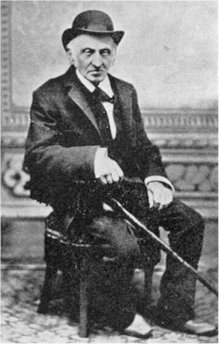Louis Rose
| Louis Rose | |
|---|---|
 |
|
| Born | March 24, 1807 Neuhaus-an-der-Oste, Germany |
| Died | February 14, 1888 (aged 80) San Diego, California |
Louis Rose (March 24, 1807 – February 14, 1888) was a pioneer developer of San Diego, California. The neighborhood of Roseville in Point Loma is named for him, as are Rose Creek and Rose Canyon.
Louis Rose was a German Jewish immigrant and San Diego's first identifiable Jewish resident. He came to San Diego in 1850, via New Orleans, Louisiana and Texas. He traveled to California with Judge James W. Robinson's wagon train party. Arriving just as California became a state in 1850, he was a member of the first grand jury and first County Board of Supervisors. He was President of the Board of Trustees for San Diego during 1853–1855, and served on the San Diego School Board. Rose was a volunteer in the Garra Indian uprising.
Rose was central in the establishment and development of San Diego's Jewish community. High Holy Day services were held in his house. The Hebrew Benevolent Society was formed at his house. He donated the land for the first Jewish cemetery. Though a layman, he officiated for the community at a Jewish wedding. Rose was a founding member of Congregation Beth Israel (San Diego). Congregation Beth Israel became Temple Beth Israel, San Diego's largest synagogue.
Rose married twice. His first marriage was to Carolyn Marx in New Orleans. The marriage ended in divorce. Later in his life, in San Diego, Rose was introduced to and married a local Jewish widow, Matilda Newman. They had two children. One child died in infancy. Their second child, Henrietta Rose became a school teacher in San Diego. She never married. She was buried in an unmarked grave until the Louis Rose Society for the Preservation of Jewish History purchased a headstone, which was dedicated in partnership with the school district, the teachers union, and the Eastern Star Masonic Organization of which she was president of a lodge.
Louis Rose was buried in the Jewish cemetery that he helped found. As San Diego developed, the old Jewish cemetery was sold and the bodies buried there were moved to a newer Jewish cemetery, the Home of Peace. In the process, Rose's original headstone was lost; later one was put in by people who knew him only by historical reputation and wished to honor his memory. The exact location of his interment is uncertain.
...
Wikipedia
